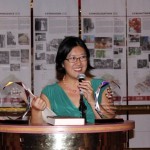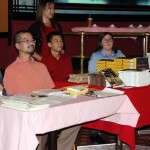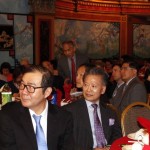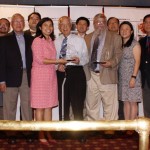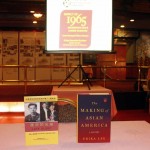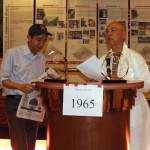By Menlei Han, bostonese.com
Boston, Nov. 10, 2015, — Chinese History Society of New England(CHSNE) held it annual meeting and dinner banquet at Empire Garden restaurant Friday evening. The theme of this year’s annual meeting is Impact of 1965: Immigration Law and Chinese in Boston. About 200 CHSNE members and guests attended the annual meeting.
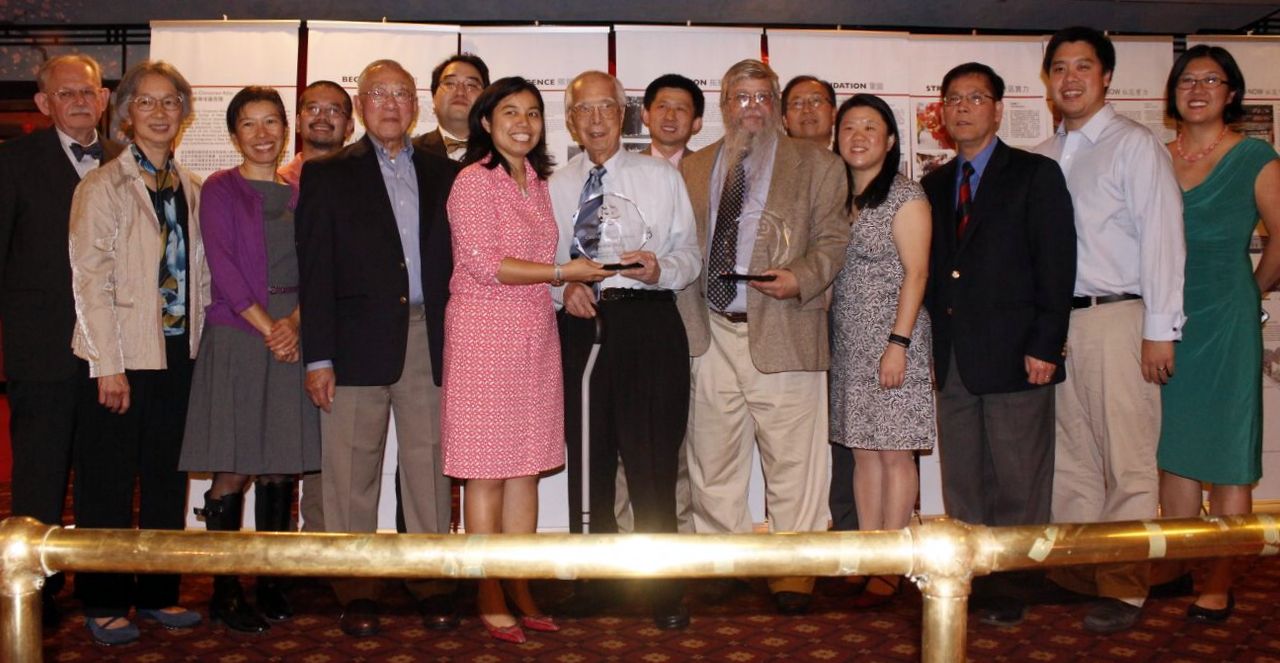
Sherry Dong hands the Sojourner Award to Arthur Wong and Gary Libby with CHSNE board members(photos by Menglei Han).
CHSNE president Sherry Dong delivered President’s Report highlighting a busy year at CHSNE. She thanked executive director Susan Chinsen and broad members for their hard word in the past year. The highlight of the annual meeting was the keynote speech by Francis Chin and Vincent Lau on the impact of the 1965 immigration law. The two immigration lawyers staged a 2-person mini-play, and time traveled from 1965 to 2065. Their play attracted attentions from all the guests, and demonstrated that the 1965 Immigration Law that changed the face of America.
According to Wikipedia, The 1965 immigration act marked a radical break from the immigration policies of the past. The law as it stood then excluded Asians and Africans and preferred northern and western Europeans over southern and eastern ones. President John F. Kennedy, who called the then-quota-system “nearly intolerable”. After Kennedy’s assassination, President Lyndon Johnson signed the bill at the foot of the Statue of Liberty as a symbolic foothold of signing the bill. The 1965 immigration law resulted in significant increase of immigrants from Asia.

New board member nominees Peter Tam, Joe Wang and Nancy Wong were confirmed at the annual meeting. This year’s Sojourner Award went to Arthur Wong of Boston Chinatown and Gary Libby of Portland, Maine.
Recipients of 2015 CHSNE Sojourner Award
Arthur Wong, for his commitment to country and community
Arthur Wong immigrated to Boston in 1938, and was among the first groups of American soldiers who landed on Omaha Beach on D-Day, June 6, 1944. He was later seriously injured in November 1944 when the Allied Forces advanced into Germany. Sixty-four years after he returned from WWII battlegrounds, Mr. Wong finally received nine U.S. military medals, including Purple Heart and Bronze Star, with the help from Senator John Kerry in 2009. The video below is the opening of TV documentary The Late Arriving Medals by Jiangmen TV in China. A number of Chinese American WWII veterans were interviewed this past summer for this documentary. David Li, CHSNE board member, played the video when he introduced Mr. Wong.
Gary Libby, for his leadership in preserving the history of Chinese in Maine

Pictures of Chinese children in Maine in the 1930s(from Maine Chinese Archive).
CHSNE vice president Wing-kai To introduced Gary Libby. He mentioned that Mr. Libby helped create the Maine Chinese Archive, which is located at the Maine Historical Society as part of its collection. Beginning in 2001 he began doing research on the history of Maine’s Chinese community and learned that Chinese people have lived in Maine since 1857.You can find photographs of early Chinese residents of Maine and some online exhibits from the Maine Chinese Archive by going to the Maine Memory Network (mainememory.net) and using the search word “Chinese.”
Since 2001 Mr. Libby has worked to buy, collect, and donate Chinese restaurant menus, hand laundry price lists, photographs, and other artifacts. He has also contributed to the collection of about 35 oral history interviews of Chinese who lived in Maine from the 1930s to the present day.
President’s Report: CHSNE Highlights
By: Sherry Dong, Translated into Chinese by: Nancy Liu
In addition to CHSNE’s general programming-tours, talks, and occasional field trips, this past year included a focus on cataloging and organizing our archival materials and making them and our website more accessible and user friendly. We also dedicated efforts toward collaboration with national Asian Pacific American groups and state and federal agencies.
A number of our collaborations led to some travels this year – we’ve been active and representing CHSNE in DC and NYC in particular. We were honored to be invited to participate in a convening in February by the Asian/Pacific/American Institute at New York University by founding director Jack Tchen, our 2014 annual dinner keynote speaker, focused on Chinese exclusion and ways to raise the national consciousness on it. In addition to roundtable discussions and a preview of a Ric Burns documentary on the Chinese Exclusion, the group was also invited to visit the New York Historical Society (NYHS) exhibit Chinese Inclusion/Exclusion and the Museum of Chinese in America (MOCA) exhibitions. Tunney Lee and I were able to participate, representing Boston. A few months later, a field trip for CHSNE members and interested community members was organized to NYC to view the Chinese Exclusion exhibit at NYHS Society and MOCA.
In May, Asian Pacific American Heritage Month, Susan Chinsen and I attended the White House Initiative on AAPIs Summit, including a visit to U.S. Senator Elizabeth Warren’s office, highlighting some of our issues as an education, cultural and historic preservation organization. This also coincided with our attendance at the 1882 Symposium, which seeks to raise national awareness of the Chinese Exclusion Acts through collaborative efforts.
CHSNE has been working with the MA Historic Commission on a Department of Interior grant to increase underrepresented communities on the National Register of Historic Places. Our goal is to register the first site connected to Boston’s Chinatown. While there are over 90,000 places listed on the registry nationally, a very small fraction recognize historical contributions of the Asian American community and/or are associated with their communities and experiences, with a very few from the Northeast and none located in Massachusetts.
This past year, our Archives & Collections committee wrote up a scope of work and we embarked on phase one, cataloging, organizing and digitizing files. Thanks to Lucy Boltz for helping further the archive by scanning over 200 documents, updating 72 items in the database, cataloging 54 boxes in the archive and photographing all of the garments and framed items in the archive along with many of the posters and reproductions and adding two oral history interviews with Tunney Lee and Amy Guen.
Thanks to Zi Jing Teoh, Spring CHSNE intern from Brandeis University and recent graduate, helped to further the inventory and research work on the Harry H. Dow Legal Archive at Suffolk University Law School Library. The work seeks to illuminate details and experiences of Chinese immigration to the Northeast during exclusion. Findings will be published in the next Chronicle and online. The research was made possible through a grant from MA Humanities Council.
CHSNE has been actively engaged with the Chinatown Atlas project and the work Tunney Lee, retired chair of MIT’s Department of Urban Studies and Planning, and his team has been doing around documenting and sharing the development of Chinatown from the 1800s to today. Thanks to a grant from Tufts University we are now able to take the Atlas on the road via a traveling exhibit—on display at the Chinatown Trade Building (lower level, 2 Boylston St, Chinatown) outside of the CHSNE office when not on loan or exhibit elsewhere.
CHSNE continues to offer Chinatown historical walking tours and new this year, we now have a modified historical tour that includes fun facts about Chinese food and points out food related spots in the community. Staff and volunteers also participated in several outreach events, notably at the Quincy Lunar New Year festival, where we offered introductory genealogy tutorials in collaboration with New England Historic Genealogical Society, and made an encore appearance with Chinatown Atlas exhibit at the Quincy August Moon Festival. Thanks to Quincy Asian Resources, Inc. for inviting us to participate in both events.
As part of our lecture series, Ruthanne Lum McCunn returned last November to discuss her latest book, Chinese Yankee: A True Story from the Civil War, and in May we hosted Emma Teng, MIT Professor of Asian Civilizations, who talked about her recent book Eurasian, at the Brookline Public Library, co-sponsored with the Brookline Asian American Family Network. In recognition of the 50th anniversary of the Hart-Cellar Immigration Act of 1965, CHSNE co-sponsored with the Chinese American Citizen’s Alliance a talk and film screening by Erica Lee, who discussed her book The Making of Asian America, and filmmaker Penny Lee, who screened April 1968: Through Chinatown Eyes. We further spotlight this important milestone in American history with our 2015 annual meeting speakers, immigration attorneys Francis Chin and Vince Lau.
The annual meeting marks change for the CHNSE board each year. Last year, we welcomed Nelson Chin, Alice Kane and Ron Suleski, and this year we want to thank several long-time board members whose terms are ending for their years of tireless service. Manyee Tang has led our Chronicle production for many years, as well as maintaining our website, two critical areas of communication between our organization and the community at-large. Shauna Lo has made numerous and substantial contributions to the Chronicle, both in submission of content and as English editor, and her detailed assistance as an organizer and researcher has created a foundation for CHSNE to build the Archive & Collection. We wish them both the best and look forward to their continued involvement.
Thank you to all of the volunteers, board members and funders for continued support and active participation. The history and legacy of Chinese in New England is a valuable resource contemporary and future generations can learn and be inspired by. We welcome interest and ideas from members and readers so please reach out and let us know.
